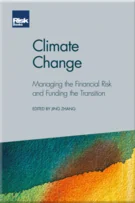Reputational Risk Management Across the World: A Survey of Current Practices
Introduction
Reputational Risk: A Short Introduction
What History Teaches Bankers about Reputation Management
An Asset–Liability View of Banks’ Reputation
Reputational Risk in the Universe of Risks: Boundary Issues
Corporate Governance Changes Following Reputational Damage in the Financial Industry
Reputational Risk and Prudential Regulation
Managing Stakeholder Expectations
Environmental and Social Risks from the Perspective of Reputational Risk
The Relationship between Reputational Risk Management and Business Continuity
Tracking Reputation and the Management of Perception at UniCredit
Successful Recovery from Reputational Crises: Legitimate versus Illegitimate Risk Case Studies
Reputational Risk Management Across the World: A Survey of Current Practices
Governance as the Starting Point for a Reputational Risk-Management Process
Managing Reputational Risk in a Major European Banking Group
The Implementation of the UniCredit Group Approach
Promotional Banks: An Introduction to Reputational Risk Management
Reputational Risk Management in a Global Insurance Company
Reputational Consequence Management: The Future
INTRODUCTION
Reputational risk (RepRisk) can be defined as a risk of unexpected losses due to the reaction of stakeholders (eg, shareholders, customers, and employees) to an altered perception of an institution.
The activities of reputation management serve the purpose of affecting the public perception of the bank, as experienced by the stakeholders. In contrast, reputational risk management is concerned with the systematic identification and assessment of incidents that could jeopardise the goal of reaching or keeping up with this perception, as well as the deduction of risk-management measures. Reputational risk can arise in every business area of a financial institution. Therefore, appropriate management processes should cover the organisation as a whole.
At the time of writing, there are neither specific regulatory requirements nor other market standards for reputational risk management beyond the general requirements of Pillar II risks as defined by Basel regulation and the respective local implementation thereof.
In the absence of specific regulatory requirements, several leading banks began to implement their own reputational risk-management process around the turn of
Copyright Infopro Digital Limited. All rights reserved.
As outlined in our terms and conditions, https://www.infopro-digital.com/terms-and-conditions/subscriptions/ (point 2.4), printing is limited to a single copy.
If you would like to purchase additional rights please email info@risk.net
Copyright Infopro Digital Limited. All rights reserved.
You may share this content using our article tools. As outlined in our terms and conditions, https://www.infopro-digital.com/terms-and-conditions/subscriptions/ (clause 2.4), an Authorised User may only make one copy of the materials for their own personal use. You must also comply with the restrictions in clause 2.5.
If you would like to purchase additional rights please email info@risk.net








